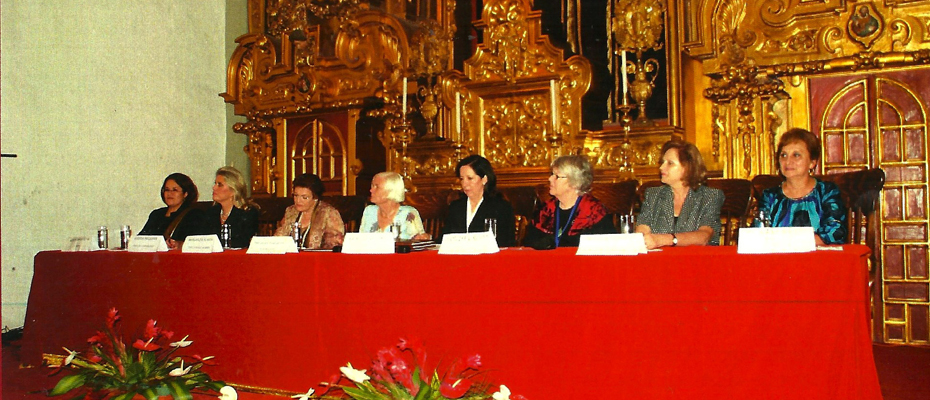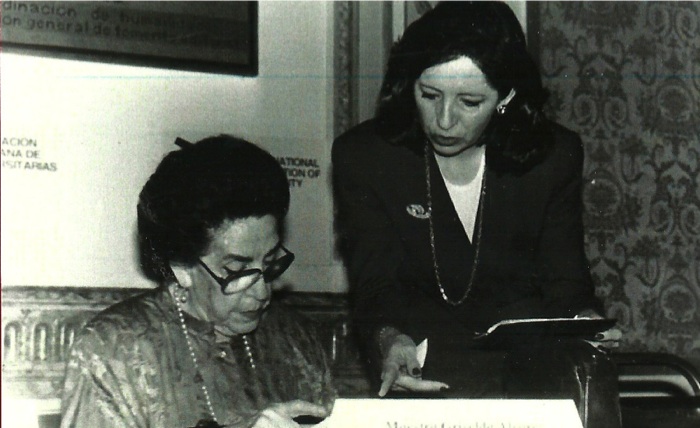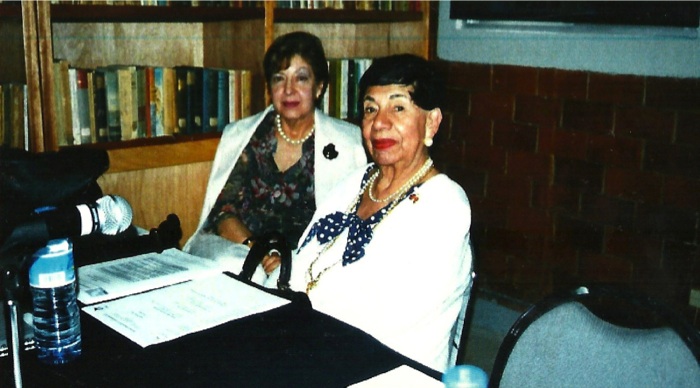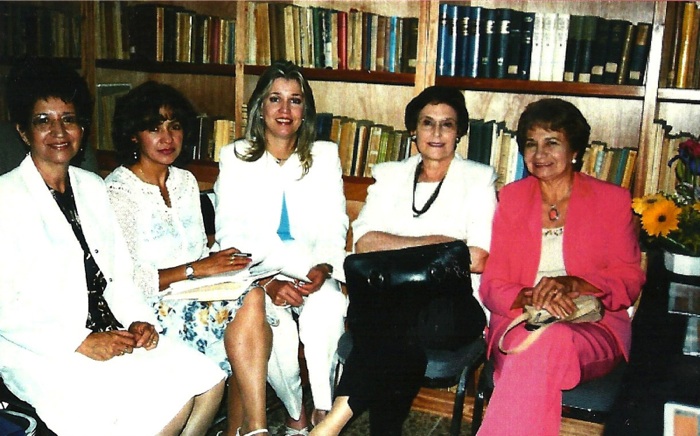History

From left to right: Gilda Bautista, Glenda Hecksher, Margarita Almada, Marianne Haslegrave, Patricia Galeana, Louisse Croot, Mirella Feingold and Maria Elena Flores

Griselda Álvarez and Patricia Galeana
Patricia Galeana
The oldest civil society organization dedicated to working for the development of women internationally is the International Federation of University Women. It emerged in Europe with pacifist purposes, in 1919, when the number of university women in the world was very small.
After the Second World War, the members of the IFUW became aware that for there to be peace in the world, there must first be peace at home, and this would only be achieved with equality between the genders and respect for the rights of all members of society.
Thanks to having had access to higher education, the university students were able to shape an international organization that currently has members in 69 countries on all continents. Its headquarters are located in Geneva, and since 1924, it has had a Research Scholarship Program to promote women graduates to occupy decision-making positions.
For its work in favor of women's human rights, IFUW has been recognized as a consultative body of the United Nations.
In 1929, Mexican university students from the Faculty of Philosophy and Letters of the UNAM formed an association and joined IFUW. Personalities such as Eulalia Guzmán, Amalia Castillo Ledón and Rosario Castellanos stand out from those years. Over time, when its founders disappeared, the Mexican association lost its membership in the IFUW and began to disintegrate.
Recently, IFUW has changed its name to Graduate Women International in order to expand its reach with other organizations.

Elisa García Barragán and Clementina Díaz y de Ovando
In 1990, 33 university women, heads of various faculties, institutes and centers from UNAM, decided to give new life to the organization, and refounded the Mexican Federation of University Women (FEMU), which recovered its lost place in the international organization.
Today FEMU is a national network made up of associations of academics from different areas of knowledge, as well as all entities of the Mexican Republic, mostly public universities; as well as by individual members, who are active academics. Its statutes establish the plural and non-partisan nature of the organization. As part of GWI, FEMU promotes the academic exchange of all its members.
Among the achievements of FEMU it is worth highlighting, to mention just a few: having promoted the creation of the Women's Rights Program of the National Human Rights Commission (CNDH); joining the Council of the CNDH its two honorary presidents for life, Doctor Clementina Díaz y de Ovando and Teacher Griselda Álvarez Ponce de León; having participated in the preparation of the women's rights booklet of the same commission; having achieved that CONACYT removed the age limit of 35 years for university students to obtain postgraduate scholarships; FEMU members joining its Council; having influenced women to be granted the same rights to social security as their partners; having promoted the creation of shelters for abused women, such as the one in Tlalnepantla, Mexico State, under the care of academics from the National School of Professional Studies of Iztacala from UNAM and supported by the municipality of Tlalnepantla; that the shelter for the care of boys and girls victims of family violence, created by the Association of University Women of Sinaloa; has created another care center for victims of Fortaleza, AC in Mexico City. Likewise, in legal matters we fight for the classification of domestic violence as a crime in all states of the Republic.
Some FEMU members include, former governors, the only female minister of the Supreme Court of Justice of the Nation, emeritus teachers of the UNAM, members of its Governing Board, magistrates, rectors and directors of schools, faculties and university institutions, teachers, researchers and disseminators of culture, public officials and prominent professionals who work for the development of Mexican women.

FEMU's essential objective is to promote a culture for peace; respect for the human rights of all members of the national community; prevent violence; promote a mentality that overcomes all discrimination; overcome androcentric patriarchal atavisms; value women's contributions to national life; work for the development of the female population through educational and cultural activities; achieve recognition of women's work; disseminate a constructive image of women through the media. FEMU represents its members before federal and state authorities, universities, and before national and international organizations or institutions, to achieve the stated goals.
Congresses, seminars, state, national, Latin American and international symposiums have been organized on a permanent basis, in which the diagnosis of the condition of women has been deepened. The conclusions and proposals obtained have been presented to the corresponding authorities, to influence decision-making that affects the female population. FEMU has an extensive bibliography resulting from its work:
- I. The participation of women in national life, 1989.
- II. Anthology of university women, 1990.
- III. Latin American university students. Leadership and development, 1990.
- IV. The condition of Colima women, 1992.
- V. The condition of Mexican women. Volume I, 1992
- VI. The condition of Mexican women. Volume II, 1993
- VII. The situation of women in Nuevo León, 1993.
- VIII. Present and prospective of women in Guanajuato, 1994
- IX. The condition of women in Jalisco, 1994.
- X. The woman from the Mexico of the transition, 1994
- XI. Girls' rights, 1995
- XII. Report of Government Institutions dedicated to women, 1996.
- XIII. The condition of indigenous women and their fundamental rights, 1997.
- XIV. Women and Constitution, 1998.
- XV. The true story of women's citizenship. Fifty years after the recognition of the Right to vote, 2003.
- XVI. Human rights of women in Mexico, 2004.
- XVII. Half a century of women's political rights in Mexico, 2008.
- XVIII. Women as agents of change for humanism and peace, 2007.
- XIX. Mexico-United States migration and its feminization, 2008.
- XX. The history of women in Mexico, 2010.
- XXI. The Reproductive Rights of women in Mexico, 2010.
- XXII. Comparative history of women in the Americas, 2012.
- XXIII. The Women's Museum, 2012.
- XXIV. Breaking the glass ceiling: women in science, education and financial independence, 2013.
- XXV. For a culture of peace: how to eliminate violence against women, 2016.
- XXVI. For the decriminalization of women in Mexico, 2017.
- XXVII. Dare to change: to a culture of substantive equality, 2018.
- XXVIII. Empowering girls and women through education, 2022.
- XXIX. The impact of the pandemic on women's lives, 2023.
- XXX. Trafficking in times of pandemic. South-North Migration, 2023.
- XXXI. The State and society in the face of care, 2024.
- XXXII. Violence against women and the feminist agenda 2030, 2024.
Herbert Marcuse wrote that the greatest revolution of the 20th century was the women's revolution and that it was irreversible. However, we must be aware that in historical processes nothing lasts forever and that things do not exist unless they are, they are done day by day, which is why we must work permanently to consolidate the achievements achieved and move towards a more egalitarian society, where peace and respect prevail for everyone, in the everyday plebiscite.
Just as the 18th century utopian socialist Carlos Faurier declared that the best way to know the degree of civilization that a man had achieved was the relationship with his partner; the philosopher of Peace, Norberto Bobbio, at this turn of the century points out that the best thermometer to measure the degree of development of a town is to see the situation of its women.
We want, as the poet Octavio Paz wanted, a sun man dispossessed of his authoritarianism and a moon woman freed from her Slavery. We aspire to a true democracy that is a way of life with the equitable distribution of power and wealth, it is certainly a utopia, but it is utopias that move the world, let us strive to achieve it.
